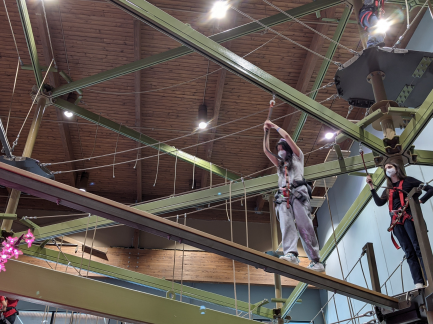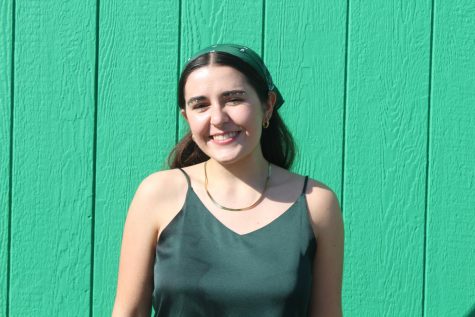ERHS Seniors Pursuing Alternative Paths to College

Julissa Mendoza Robles zip-lining on vacation.
February 9, 2022
As college application season comes to an end and the decisions begin to arrive, some seniors are pursuing a different route than the standard course of higher education after high school. Despite the overwhelming culture surrounding the pursuit of a traditional four-year college, in reality there is a variety of post-graduate pathways being explored by the class of 2022 at Eleanor Roosevelt High School (ERHS).
Senior Julissa Mendoza Robles is taking a gap year after high school. Mendoza Robles noted that she has wanted to take a gap year since eighth grade. She was inspired by a YouTuber who had taken a gap year which included a lot of traveling, something Mendoza Robles says she “definitely wants to do.” And despite not having what she calls concrete plans for her gap year, Mendoza Robles says she “intends to attend college after it.”
She is hoping to be accepted into a gap year or gap semester program that will allow her to travel outside of the country, however Mendoza Robles says she could just as easily see herself “having a job in Maryland to save up for college.” She thinks that both of these options have benefits and will give her opportunities to “explore [her] interests,” so she has a better sense of what she wants to do in college. She speculated that because she was not able to have “responsibilities,” such as having a job in high school, this time will be beneficial to her in learning how to balance school and work. Others have echoed this desire to get into the workforce, including Adrianamae Borromeo.
Borromeo is another senior at Roosevelt that will not be attending college in the fall. She is pursuing a career in auto mechanics. She explained that she “prefers jobs that are hands on.” Borromeo feels that it is “more practical to settle first,” especially because she has had “difficulties in deciding what path to take in college.” She said that she does eventually want to go to college, but does not want to go “in hopes of getting a job after.” She clarified that she wants to go to college “in order to learn.” Borromeo asserted that she sees college as a place of higher education, rather than “a necessary step in being successful.”
Both Mendoza Robles and Borromeo share the sentiment that they have felt very burnt out over the past few years, which has solidified their decision to pursue alternatives to college. As Mendoza Robles put it, “a break would really help [her]” with said burnout. She says it will be a “much needed break from school for [her] to reflect on [herself]” and what her future plans will be. Borromeo admitted that school is “very stressful” for her and that she thinks she “deserves a break from it.” Both Mendoza Robles and Borromeo want to clear up misconceptions about college alternatives.
Mendoza Robles wants others to know that taking a gap year does not completely invalidate the possibility of going to college in the future. She states that for her college “has always been one of [her] top priorities despite the gap year.” And Borromeo just wants others to “pick a path that [they] really want to do.” She advises that students questioning their future should “talk to older people who have taken different paths.” She encourages seeking these mentors and possibly using them as “a guide in making a decision.”
No matter if a student is pursuing a gap year, immediately entering the workforce, or enlisting in the military, all of these options are valid, regardless of the presence or absence of college in these plans. It is important to pick an option that is best for your individual needs and wants. And it is essential that ERHS students know that no matter what they pick, success is possible in all of these choices.



